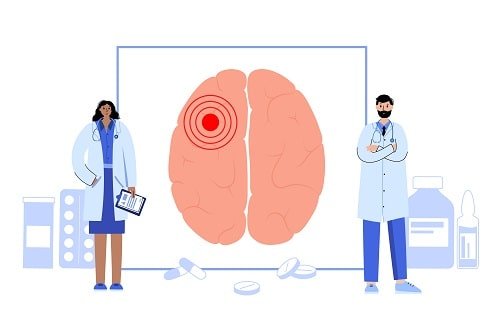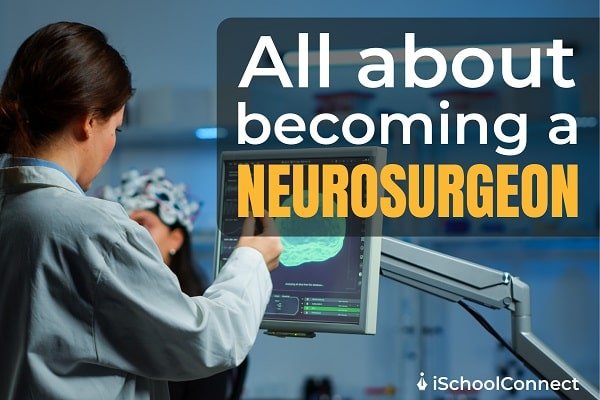Table of Contents
If reading about the nervous system and carrying out procedures interests you, then becoming a neurosurgeon can be your thing! Neurosurgeons use state-of-the-art imaging technologies to get to the root of your problem and find the treatment that suits you best.
So, if you are intrigued about learning more about this profession, look no further. Learn how to become a neurosurgeon, the best universities to pursue this course, salaries, and more. Keep scrolling!
Who is a Neurosurgeon?

A neurosurgeon doctor helps diagnose and treat conditions related to the nervous system, including the brain and spine. Now, do not confuse a neurosurgeon with a neurologist. The difference between a neurologist and a neurosurgeon is that the former focus on the forms of treatment, and the latter is specifically trained and certified to perform surgical treatments.
Neurosurgeons can treat people suffering from injury or trauma caused to the brain and spine. Besides, they can correct blocked arteries, chronic low-back pain, birth defects, like epilepsy, Parkinson’s disease, tumors, and peripheral nerve issues.
What does a Neurosurgeon do?
Besides performing surgeries, neurosurgeons are often consulted by other doctors regarding various cases, medicines and to deal with unique challenges. They help evaluate and rehabilitate people with neurological conditions post-surgery.
Usually, a neurologist recommends people to consult a neurosurgeon if there is a need for surgery. Some of the cases that neurosurgeons operate are:
- Clipping
- Endovascular Repair
- Disk Removal
- Craniotomy
- Lumbar Puncture
- Aneurysm Repair
Neurosurgery is an advanced field. Therefore, it may require a team of plastic surgeons, orthopedic surgeons, manual therapists, interventional radiologists, and others to perform a surgical procedure.
Neurosurgeons may carry out a diagnosis that involves:
- Magnetoencephalography (MEG scan)- This test helps neurosurgeons find the source of seizures.
- Magnetic Resonance Imaging (MRI)- It helps create detailed pictures of the inside of the body.
- Positron Emission Tomography (PET scan)- This scan is often used to diagnose cancer.
- Computed Tomography (CT scan)- This test shows more details about a human body than a standard X-ray.
Education and training of Neurosurgeons

Neurosurgeons have to undergo training for the longest period as compared to other doctors. The training includes:
- Four years of medical school
- A year-long internship
- Five to seven years of residency
- An additional year of studying a subspecialty
Additionally, as a Neurosurgeon, you will require certification from the American Board of Neurological Surgery before you begin your practice. Board certification requires an extensive period of both written and oral examinations.
Step-by-step process to become a Neurosurgeon
- Set your goals- It is ideal to set your goal of becoming a neurosurgeon very early in life. This helps you stay focused and prepares you well. Also, you must gain knowledge about how the human body works, how chemicals react, and the forces that act on the body. You must pay extra attention to subjects such as biology, chemistry, and physics.
- Degree- While there is no specific degree required for undergraduate study, you should take advanced classes to understand and be able to handle in-depth biology and chemistry courses in college.
- College- You must get a bachelor’s degree from an accredited college with pre-med prerequisite courses, such as Microbiology and Biochemistry. Additionally, advanced Mathematics, English, and Statistics are important subjects. In order to get admission to a medical school, you will require a specific grade or cut-off marks.
- Gain experience- During undergraduate study, gaining experience like volunteering at a hospital, performing community service, and doing research work will give you an edge.
- Medical specialties- Out of the four years of study in medical school, the first two years consists of the course and lab work; the next two years allow you to experience a variety of medical specialties. After completing rotations, you are likely to figure out your specific interests and develop skillsets accordingly.
- Internship- After finishing medical school, you must spend a year doing an internship in a hospital.
- Residency programs- These are the next and last between six and seven years.
- License test- All physicians must appear for the license test to work in a particular state. Neurosurgical subspecialties can be obtained after you get the license. The subspecialties include pediatric neurosurgery, spinal surgery, and neurovascular surgery.
Top universities to study Neurosurgery

Now that you know the requirements of becoming a neurosurgeon doctor, look at some of the best universities from where you can fulfill this dream!
- University of California – San Diego, USA
- Washington University – St. Louis, USA
- University of Pennsylvania, USA
- Stanford University, USA
- University College London, UK
- Columbia University, USA
- John Hopkins University, USA
How much does a Neurosurgeon earn?
The Neurosurgeon’s salary depends on various factors, such as education, certifications, additional skills, and experience. When we say additional skills, we mean patience and understanding.
To give you an idea, the average Neurosurgeon salary in the USA is between $474,901 and $798,201. The average salary for a Neurosurgeon in India is INR 29,20,219 per year.
Neurosurgery is a competitive field and requires a broad spectrum of knowledge. Therefore, you must apply practical knowledge and be able to manage unprecedented and critical situations to become the best Neurosurgeon. Additionally, professional and vocational skills, along with leadership skills, will help you be on top.
What’s next?
Technology plays a major role in the field of neurosurgery. With new advancements and treatments, this field of medicine is staying ahead and exploring new possibilities. So, as a Neurosurgeon, you must be extremely responsible, understand the dynamics and be ready to endure challenges.
Also, if you need any help selecting the best university for pursuing a degree in Neurosurgery, reach out to us. We’d be happy to help!
Good luck!
FAQs
Q1. What is the most common reason for neurosurgery?
Answer- The most common reason for neurosurgery is brain tumors.
Q2. What to expect from a neurosurgeon during the first visit?
Answer- During your first visit, your medical history may be checked, and diagnostic tests will be advised to carry out treatment options.
Q3. Can neurosurgeons treat Sciatica?
Answer- Yes, Neurosurgeons can treat Sciatica.






